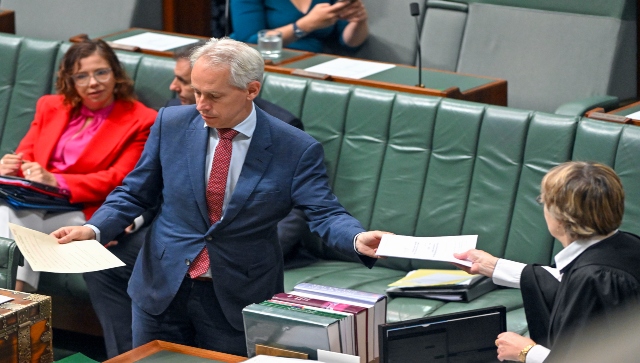Under emergency law proposed on Thursday in response to a High Court finding that foreigners cannot be detained indefinitely as an alternative to deportation, migrants with criminal records in Australia face up to five years in prison for violating the terms of their visas. Since a judge last week declared that the indefinite incarceration of migrants is unlawful, the administration said it had freed 84 foreign nationals, the majority of whom have convictions for crimes like rape and murder. The decision overturned a 2004 High Court decision that had permitted the detention of stateless persons in migrant centres indefinitely when there was no chance that they would be deported from Australia. The decision also undercuts Australia’s harsh policies toward asylum-seekers who arrive by boat and criminals who are deported despite long years living in Australia. People smuggling boat arrivals have virtually ended in the decade since Australia banished their passengers to remote Pacific island detention camps. The legislation introduced in Parliament by Immigration Minister Andrew Giles would have let the government order certain migrants to wear electronic tracking bracelets and to comply with curfews. Failure to comply with those visa conditions could be a criminal offense punishable by up to five years in prison. The released migrants include “certain individuals with serious criminal histories,” Giles told Parliament. “These measures are consistent with the legitimate objective of community safety, and the rights and interests of the public, especially vulnerable members of the public,” Giles said. Curfews and electronic monitoring would become mandatory for all the freed migrants rather than at the Giles’ discretion under opposition amendments later accepted by the government to ensure key changes become law on Thursday. Human rights lawyers argued that the measures could be challenged in court as punitive and excessive. “Any new conditions must meet some basic tests. They must be necessary, they must be reasonable, proportionate, they must not be punitive or deprive people unnecessarily of their liberty,” said David Manne, a lawyer who represents several of the released migrants. “We shouldn’t readily be handing to the government extraordinary powers to impose severe restrictions on our lives without proper scrutiny. It’s hard to see how there has been proper scrutiny given how urgently this has all been introduced,” Manne added. The government has given assurances that migrants have been released under strict visa conditions, with some required to report to police daily. Manne said some of his clients were initially freed from prison-like detention facilities without visas in the government’s haste to comply with the court verdict. The legislation was pushed through the House of Representatives on Thursday morning. The government later accepted further amendments proposed by the opposition in a deal that ensures support for the key changes in the Senate. Acting Prime Minister Richard Marles said the opposition amendments made curfews and electronic monitoring mandatory. Other amendments banned freed migrants from contact with children and victims of the migrants’ crimes. Another amendment set minimum prison sentences for breaches of visa conditions, in addition to the five-year maximum sentences. Opposition leader Peter Dutton described the government’s proposals as inadequate to ensure community safety. “These are people who have committed serious offenses and the likelihood of them reoffending is very, very high,” Dutton said. The minor Greens party opposed what they described as “anti-refugee laws.” “These are draconian laws that provide the minister with powers never before seen in Australia and the Greens will not be supporting them,” Greens immigration spokesperson Sen. Nick McKim said. Giles said further legislation would be considered once the High Court’s seven judges publish the reasoning for their decision. All the released migrants previously had their visas canceled or had been refused visas because of their criminal records or other evidence of poor character. They were ordered into indefinite detention because they had no reasonable prospects of being deported to a country that would accept them. They include Afghans, a nationality that Australia has stopped deporting since the Taliban seized power in their homeland. They also include Iranians, because Iran will only repatriate its citizens who return voluntarily. The test case was brought by a member of Myanmar’s persecuted Rohingya Muslim minority, identified in court as NZYQ, who was convicted of raping a 10-year-old boy in Sydney in 2015 and sentenced to five years in prison. A people smuggler brought NZYQ to Australia by boat in 2012 and he raped the child four months after he was released from an initial period of migrant detention. He was put in indefinite detention after prison. With inputs from agencies
Under emergency law proposed on Thursday in response to a High Court finding that foreigners cannot be detained indefinitely as an alternative to deportation, migrants with criminal records in Australia face up to five years in prison for violating the terms of their visas
Advertisement
End of Article


)

)
)
)
)
)
)
)
)



